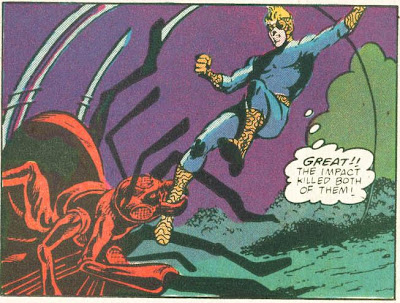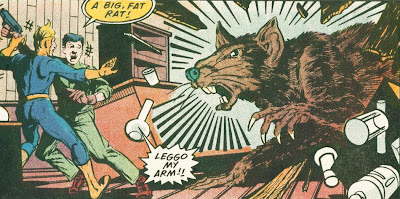In my last post, I showed you the glorious tale of
What If Iron Man Lost the Civil War?, which ended in such a way that betrayed its original premise: iron Man did not so much
lose the Civil War as he and Captain America, instead, formed what was essentially a voluntary superhero service, much like the police, but fueled by bizarre forms of radiation and technology rather than donuts. (I kid, of course - being a police officer, especially an honourable one, is tough work.)
So, why is this the
best super-hero story ever written?
It's because the writer, Christos Gage, has helped provide a solution to a philosophical conundrum that was puzzling me for quite some time: how do you justify the existence of superheroes in a society that stands for individual rights and objective law?
I use the phrase "objective law" to refer to a system of law in which justice is afforded evenly and equally amongst all citizens. This means that a person's rights are protected by default: he doesn't have to find a willing security provider to protect his rights.
The best way to provide this level of protection is to grant the government a
monopoly on the initiation of force. This means that while you can defend your life and your property in the immediate moment that it is threatened ("self defense"), retaliation, that is, the pursuit of justice and compensation, will be the exclusive domain of the government. If this were not the case, each person would have to find a way to achieve justice for himself - like a superhero - and their would be no objective standard with which to judge it.
David Odden, over at the Objectivism Online forum, sums up the issue rather handedly when he answers a user who was arguing for an anarchic system of law, based upon private "Security" companies - superheroes, if you will.
The following passage is unedited from the original source, (here:
http://forum.objectivismonline.net/index.php?showtopic=7325&st=40&p=123458&#entry123458), with the exception of omissions for expediency (that is to say, I left the spelling, grammar, and whatnot intact, but several parts unrelated to my point have been excised).
...what is the law? (I'm hoping for something more informative that a Fuller-morphed-into-Hart sound bite). This question includes: what are the injunctions -- the things you may not legally do to another person of his property -- and please focus on non-obvious issues, not just "don't kill, don't steal". ... . I've pointed to copyright and patent law as one area to consider; defamation is another; law pertaining to abandoned property is a third. To be included in this is discussion of remedies -- supposing a person is guilty of theft, what exactly is the remedy. And finally, you need to discuss procedural law. For example, in finding guilt or innocence, is the burden on the accused to prove innocence or is it on the accuser to prove guilt (remember that it currently actually goes both ways, depending on jurisdiction); are their any standards for defining "legally obtained evidence" or is any evidence whatsoever, gottem by whatever mean "just fine"; and is there a standard for treating illegal evidence? Can the accused be forced to testify against himself; is there any penalty for perjury? Does the accused have the right to bring an attorney or other representation?
The point is that properly constructed government (monopoly government) has to answer these questions, and has answered these questions, but once answered, you can predict the relationship between law and your actions (that is, either you have or you have not broken the law). This result is because there is a single law, which can be known by all. That guarantee does not exist under anarchy, and instead you have the possibility of each individual defining his own law which he can declare "protects his rights", and forcibly defending his supposed rights directly or through an agent. Thus I could decide that you have no right to an attorney, my mere allegation of your wrong-doing is sufficient to force you to appear before my court, and if you don't have the economic wherewithall to mount a forcible defense of what you perceive to be your rights (to only be taken for just cause, to have an attorney to defend you, and the right to presumption of innocence), you will be rather SOAL. If you think that that is an acceptable outcome, they you could just say that and we can be done with it; if, on the other hand you think that is an utterly appaling outcome, I want to see how you intend to make law uniform.
Costumed vigilantes frequently take the law into their own hands. Batman steals evidence, violates property rights, assaults potential witnesses (see
here for details)... and we tend to applaud him for it. Superheroes are vigilantes, using their own standards of evidence and punishment to deal with evil-doers. Ever wonder why the Joker never stays locked up for long? I'm guessing it's because Batman isn't exactly forthcoming when it comes to how he goes about his investigations, or, like shown previously, adhering to the letter of the law.
A very good example of the problem with superheroes is presented in the recent
Identity Crisis
event by DC Comics. The heroes, Green Arrow, the Elongated Man, and others, all got together to avenge the death of Sue Dibny- to bring the murderer to justice. Of course, they all thought it was the villain, Doctor Light, based on information that they and they alone had. If it had indeed turned out to be this character, given the circumstances of the investigation, how would they prove it? Hell, better yet, let's look at why they thought the perpetrator was indeed the good doctor.
Doctor Light once broke into the Justice League's secret satellite and attempted to rape the Elongated Man's wife, Sue. To prevent him from exposing their secret identities, the heroes elected their own form of justice: they would erase his memory. In the process, Doctor Light was lobotomized and became less than half of his former self: he became an idiot. The Justice League then wiped the mind of Batman to prevent him from telling anyone of their actions. As a result, Batman began his own program of justice: a satellite that would spy on all of the superheroes, and hold the keys to their defeat. Once again, this private justice resulted in the horrible event known as "
The OMAC Project
," where people were transformed into mindless killing machines, and worst yet, Maxwell Lord murdered
Ted Kord, the Blue Beetle.
These might be isolated incidents, you say - exceptions that do not prove the rule. But how many times has Batman illegally tapped a phone? How many times have the X-Men chased after a new threat, setting out to defeat it without proof of guilt?
Superheroes frequently violate the principle that there should be a monopoly on law the ensures the rights of a country's citizens evenly and equally. They decide what evidence is satisfactory to them, they decide how much force is necessary to apprehend the villain, and they often even decide the punishment that the villain will receive - the classic "Phantom Zone" comes to mind.
Then there's the problem of property damage - when superheroes fight super-villains, buildings come down, cars are used as clubs, and private property is simply decimated. Who's to be held responsible for the destruction? Who's to pay restitution? One could argue that many villains are simply interested in stealing money, and that the shit only hits the fan once the hero shows up. Hell, on the cartoon series
Justice League Unlimited, Superman usually looks for any excuse he can to pick up a stranger's car and smash it against the bad guy.
But superheroes are admirable characters - they do protect the little guy, and they tend to be on the side of justice, even if they often flout objective law. If it were otherwise, we probably wouldn't cheer them on as much as we do. It would be unthinkable to simply stop writing about these vigilante heroes, and we can't write about them all being locked or put in jail. We must also consider the problem of the
super-villain, a class of beings, unique to the superhero genre, that can only be opposed by other powerful beings - i.e., superheroes. I think the police would have some trouble trying to apprehend Venom.
So we reach an impasse: we must apply the idea of objective, fair law to the superhero genre, but we must take into account the particulars of that genre, as well. We could force the superheroes to join the police or the military, but they would have to expose their secret identities in order to do that, which brings the problematic super-villains back into the discussion. These beings can warp space and time and shoot energy beams from their hands - it would probably be best if they didn't know who your loved ones were.
Plus, superheroes do tend to work better alone when they are doing what Batman does - investigating crimes perpetrated by characters that the police simply do not have the power to handle. So what do we do?
Enter Tony Stark: he thinks that superheroes should be subject to objective law, but that they should have their identities exposed, and be in eternal service to the government simply by virtue of having powers. Not a good idea, I think you've realized. Captain America believes that powered individuals should be able to choose whether they're going to be forever indebted to the government - but his solution, that is, no solution, would also leave the possibility for anyone who can manipulate the weather at will to punish criminals as they see fit, without any responsibility for their actions. Niether side can be right, obviously - superhumans need to respect the process of law, but then again, so does the government!
The answer was provided by Mr. Christos Gage: The Avengers would become an independent certification board, much like the ESRB. If you wanted to be a superhero, you wouldn't need to get Avengers certification, but you'd run the risk of being arrested for any of the myriad charges that victim could claim against you. For example, The Riddler could charge Batman with breaking and entering, or the citizens of Metropolis could sue Superman over the value of that car he's smashing up on the cover of Action Comics #1. By taking part in the Avengers training program, a superhero wouldn't need to reveal his identity, or be subject to the whims of the government (as, for example, in the fifty-state initiative, which might relocate some of those million-or-so New York superheroes to Utah). In addition, that hero would have the resources of the Avengers behind him if he ever messed up and destroyed a car or two. The Avengers, in turn, would work with the government to make sure that it's members were accountable for their actions, much like private security contractors that work for the military. It's the best of both worlds: the government still holds the monopoly on retaliation and justice, and superheroes can continue to do what they do without worrying about whether they have the authority to, say, use their super-hearing to listen in on
Tobias Whale's private conversations.
And Captain America doesn't need to go crazy in his quest to kill
the white whaleIron Man. And Iron Man doesn't need to turn into a despotic cradle robber, taking mutant babies from their parents so that he can train them to be government slaves. And Spider-man wouldn't have needed to unmask, which wouldn't have then resulted in him refusing to face the consequences of his decision and erasing his marriage to Mary Jane from reality. And I wouldn't need to write about this, or Spider-man #545, either. We'd
all end up winners under this plan.










































